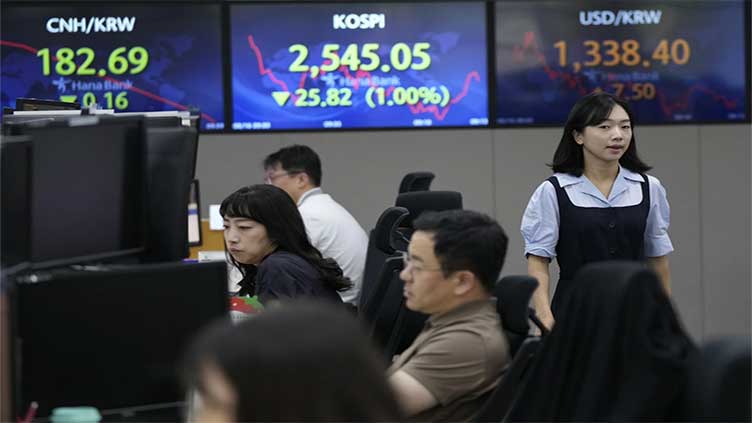Wall Street is mixed a day after latest August tumble

Business
Wall Street is mixed a day after latest August tumble
NEW YORK (AP) — Wall Street is drifting at the open of trading, and stocks are mixed a day after their latest tumble. The S&P 500 was 0.1% lower Wednesday, coming off a loss of 1.2%. The Dow was virtually unchanged, and the Nasdaq composite was 0.4% lower. Stocks have been pulling back in August amid several concerns, including worries that their gains in the first seven months of the year were overdone and that interest rates may stay higher for longer. The Federal Reserve may offer more clues about where rates are heading when it releases the minutes from its latest meeting in the afternoon.
THIS IS A BREAKING NEWS UPDATE. AP’s earlier story follows below.
Wall Street trading is stable early Wednesday, a day after another economic red flag for China’s economy overshadowed more evidence that consumer spending in America, a dominant driver of the U.S. economy, remains very strong.
Futures for the Dow Jones industrials and S&P 500 were essentially unchanged before the opening bell Wednesday.
In a week heavy with retail sales data, the government reported Tuesday that Americans increased their purchases at retailers last month, a sign that solid consumer spending is still powering a resilient U.S. economy.
Retail sales rose a better-than-expected 0.7% in July from June, and higher than a revised 0.3% increase the previous month. While economists pointed out that some of that spending got a jolt from events like Amazon’s annual sale, it was also the fourth consecutive month of increased spending.
How long Americans can absorb elevated in inflation and rising interest rates is still a hotly contested subject.
“This is perhaps largely due to the huge sale efforts that took place both online from Amazon and at major stores in general,” Clifford Bennett, chief economist at ACY Securities. “It could be the case that all of that retail sales gain completely disappears in August. Remember, we did say this would be a strong result, but possibly the last of the good retail sales numbers for quite some time.”
Target jumped more than 8% in premarket trading after the Minneapolis retailer beat second-quarter forecasts, even though it dialed back expectations for the rest of the year.
Like Home Depot the day before, Target reported that sales fell from a year ago, as shoppers focused more on groceries rather than discretionary purchases. Retail bellwether Walmart reports quarterly financial results Thursday.
The strong U.S. retail sales report Tuesday raised hopes that the economy can keep growing and avoid a long-predicted recession. But on the downside for markets, it could also raise the Federal Reserve’s resolve to keep interest rates elevated in order to grind down inflation.
Later Wednesday, the Fed releases minutes from its last meeting, when it returned to raising interest rates, lifting its benchmark rate to a 22-year high. High rates work by making it more expensive for individuals and businesses to borrow money, while hurting prices for investments.
“If the wording of the minutes hints at the (Fed) needing to maintain interest rates at elevated levels for longer, this could further sour the mood in financial markets,” said Tim Waterer, chief market analyst at KCM Trade.
In equities trading, Coinbase climbed more than 3% in before the bell after it said it received regulatory approval to bring federally-regulated crypto futures trading to eligible customers in the U.S.
Intel shares held steady after the chipmaker said it would terminate a $5.4 billion deal to acquire Israeli chip manufacturer Tower Semiconductor after Chinese regulators failed to sign off on the deal amid rising tensions with the United States.
Also weighing heavily on markets this week are more worrisome economic signals from China.
Coming into this year, the expectation was that China’s economy would grow enough after the government removed anti-COVID restrictions to prop up a global economy weakened by high inflation. But China’s recovery has faltered so much that it unexpectedly cut a key interest rate on Tuesday and skipped a report on how many of its younger workers are unemployed.
“A recent set of disappointing economic data out of China has not been encouraging for the region,” said Yeap Jun Rong, market analyst at IG.
Japan’s benchmark Nikkei 225 dropped 1.5% to finish at 31,766.82. Australia’s S&P/ASX 200 dove 1.5% to 7,195.20. South Korea’s Kospi dipped 1.8% to 2,525.64. Hong Kong’s Hang Seng slipped 1.4% to 18,329.30, and the Shanghai Composite lost 0.8% to 3,150.13.
At midday in Europe, France’s CAC 40 edged up 0.1%, Germany’s DAX rose 0.2% and Britain’s FTSE 100 slipped 0.4%.
In energy trading, benchmark U.S. crude rose 24 cents to $81.23 a barrel. The price for a barrel of U.S. crude oil dropped $1.52 to $80.99 Tuesday. Brent crude, the international standard, added 22 cents to $85.11 a barrel.
In currency trading, the U.S. dollar rose to 145.74 Japanese yen from 145.57 yen. The euro cost $1.0913, up slightly from $1.0904.
On Tuesday, the S&P 500, Dow Jones Industrial Average and Nasdaq composite all fell 1% or more.

